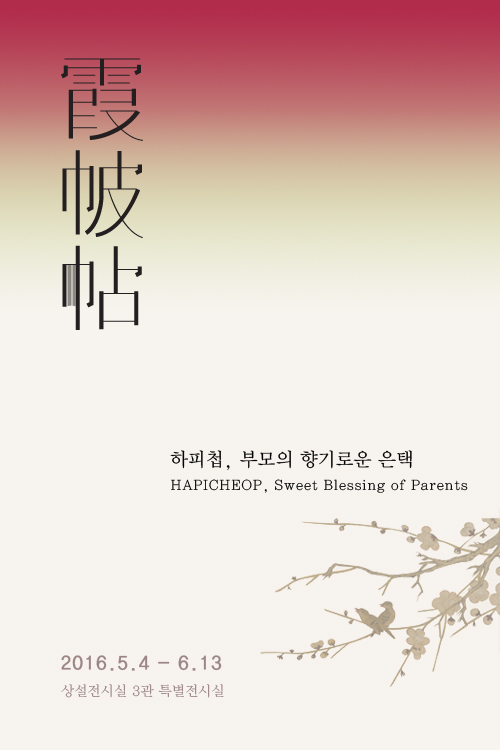National Folk Museum of Korea purchased 'Hapicheop’ (a Calligraphic album written on the skirt) by prominent scholar Jeong Yak-Yong (National Treasure No. 1683-2, hereafter Hapicheop) in last September. The museum kept its promise on providing the Hapicheop more access to more public viewers b holding this year's special exhibition.
The Hapicheop is a calligraphic album of writings by Jeong Yak-Yong (1762-1836) to give lessons to his two sons on the skirt of his wife, Hong, when he was exiled to Gangjin, South Jeolla Province, South Korea. The calligraphic album fully holds his concerns and sadness over his family as a husband and father. In particular, it delivers messages on the importance and values of family today when the society becomes materialized and family relationship becomes weak. This special exhibition would let visitors think about 'Blessing and Help of Parents' as Jeong Yakyong requested.

[Section 1]
Married Couple, Father and Mother
A Married couple is the smallest stable unit of human relations for a family. The offspring is born and nurtured by love from parents and the married couple becomes a real father and a mother in the process.
Jeong Yakyong was married to Hong Hyewan, a year older than him, when he was 15 (1776). The relationship of Jeong and his wife, Hong, is fully shown and written on calligraphic albums. Dasan(one of his pen name, meaning ‘the mountain of tea’) and his wife had spent 60 years together as supporters and father and mother of children nurtured with love.
[Section 2]
Hapicheop, Heart of Parents for Children
Father and mother nurture their offspring with love. It is desperate for their child to rightly grow even though parents cannot be with the offspring for some unavoidable reasons or situations.
Jeong was exiled to Gangjin in Jeonnam Province in 1801 when he was engaged in the White Paper Scandal of Hwang Sayoung on the Catholic. His life of exile lasted 18 years until he was 40. He would love his remaining 3 children so much because 6 of 9 children were dead before 3 years old. In the 10th year of his exile (1810), Jeong expressed his sorrow for not being with children as a father and wrote down worried message on pale red skirt sent from his wife. This is called Hapicheop and Maehwabyeongjedo (painting of plum tree and birds with poem). Jeong disciplined his two sons to behave as scholar-officials and wished his marrying daughter to have peace and harmony at home.
[Section 3]
Scent of Ink Stick for descendants
A child nurtured with love of parents meet a spouse and has a family. The lessons from parents succeed to the next generation in the new family.
Jeong was released from the exile in 1818, reunited his wife, spent time together, concentrated on studying and was dead on the 60th wedding anniversary. Children and descendants of Jeong and his wife, Hong, lived and practiced values of life inside of Hapicheop. They studied practical learning based on cultural knowledge and their father's writings to reach the true meaning.
[Epilogue]
This year marks the 180th year since Jeong was dead. The hearts of the father and the mother in the Hapicheop are still alive in our heart even though long time has passed. All the parents wish their children to grow well in love with the family.



